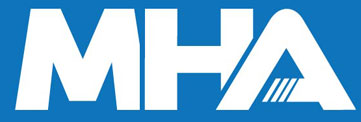The Importance of Proper Waste Management Equipment in Workplaces
Date Posted:4 February 2025
Proper waste management is not just a regulatory requirement; it’s a critical aspect of running a safe, efficient, and sustainable workplace.
Efficient waste management is a great way of maintaining a safe, sustainable, and productive workplace. It goes beyond mere compliance with regulations, significantly contributing to environmental conservation, employee health, and operational efficiency. Proper waste management equipment is essential to streamline processes, reduce hazards, and minimise environmental impact.
This blog explores the importance of having the right waste management tools in your workplace and how they can enhance your business's performance.
1. Enhancing Workplace Safety
One of the most critical reasons for investing in proper waste management equipment is to create a safer work environment. Mishandled or improperly disposed waste can lead to accidents, contamination, and other hazards.
• Minimising Hazards: Items like sharp tools, heavy debris, or hazardous substances require specific handling and disposal methods. Waste bins, spill containment pallets, and drum handling equipment are designed to prevent leaks and spills, reducing risks for workers.
• Regulated Disposal of Hazardous Waste: Using equipment like bunded pallets ensures that dangerous materials, such as chemicals and flammable substances, are stored and disposed of according to safety regulations.
2. Improving Workplace Hygiene
Unmanaged waste creates unsanitary conditions, leading to odours, pests, and potential health hazards. Proper waste management equipment helps maintain cleanliness and hygiene, which directly impacts employee well-being.
• Segregated Waste Bins: Colour-coded or labelled bins for different types of waste (e.g., recyclable, organic, hazardous) ensure waste is disposed of correctly, promoting hygiene and reducing cross-contamination.
• Efficient Collection Systems: Waste trolleys and bin tippers simplify the process of collecting and transporting waste, keeping the premises clean with minimal effort.
3. Compliance with Environmental and Workplace Regulations
In Australia, workplaces must comply with stringent waste management and environmental regulations. Failing to meet these standards can result in hefty fines, legal actions, or reputational damage.
• Regulatory Requirements: Adopting equipment such as chemical spill kits and bunded pallets ensures compliance with environmental laws, particularly for businesses dealing with hazardous materials.
• Sustainable Practices: Proper waste management equipment aligns with Australia’s commitment to reducing landfill waste and promoting recycling, allowing businesses to contribute positively to environmental goals.
4. Supporting Sustainability Initiatives
Sustainability is a growing priority for modern workplaces. Implementing proper waste management tools is a tangible step toward reducing your environmental footprint.
• Recycling Solutions: Equipment like balers and compactors enables businesses to process recyclable materials efficiently, reducing the amount sent to landfills.
• Reusable Waste Containers: Durable and reusable containers help minimise waste generated from single-use materials.
• Energy-Efficient Systems: Advanced waste handling equipment is often designed to consume less energy, further supporting sustainability goals.
5. Boosting Operational Efficiency
Time and productivity losses due to inefficient waste disposal can affect your bottom line. Proper equipment ensures that waste is managed effectively without disrupting day-to-day operations.
• Organised Workflow: Designated waste management stations with appropriate tools help streamline processes, enabling employees to focus on their tasks.
• Waste Compaction: Using compactors reduces the volume of waste, saving space and lowering transportation costs.
• Efficient Collection Tools: Trolleys and wheelie bins reduce the time spent moving waste across large facilities, enhancing productivity.
6. Customised Solutions for Different Industries
Every workplace has unique waste management needs depending on its industry. Selecting equipment tailored to your operations ensures optimal performance.
• Manufacturing: Factories benefit from heavy-duty waste bins, balers, and chemical spill kits for handling industrial waste.
• Retail and Warehousing: Recycling stations, compactors, and rubbish trolleys help manage cardboard, packaging, and general waste.
• Hospitality: Food waste bins and grease traps are essential for restaurants and hotels, ensuring hygiene and compliance.
• Construction: Skip bins and spill containment solutions are critical for managing debris, hazardous materials, and liquids on-site.
7. Reducing Costs Associated with Waste Management
Proper equipment can help businesses reduce waste management costs over time by improving efficiency and minimising unnecessary expenses.
• Reduced Waste Volume: Compactors and balers significantly decrease the volume of waste, lowering transport and disposal costs.
• Minimised Fines and Penalties: Compliance with waste management regulations eliminates the risk of fines due to improper disposal.
• Longevity of Equipment: Durable and well-maintained equipment reduces the need for frequent replacements, offering long-term cost savings.
8. Building a Positive Reputation
A workplace committed to proper waste management demonstrates responsibility and care for the environment. This boosts your brand's reputation among customers, employees, and stakeholders.
• Attracting Eco-Conscious Clients: Businesses that adopt sustainable practices are more likely to appeal to environmentally conscious customers.
• Employee Morale: Employees feel pride in working for a company that prioritises sustainability and safety, improving morale and retention.
• Community Impact: Proper waste management reduces pollution and fosters goodwill within the community.
9. Essential Waste Management Equipment for Your Workplace
Investing in the right waste management tools is crucial. Here are some examples of essential equipment available at Verdex:
• Wheelie Bins and Trolleys: For the easy collection and transport of waste across facilities.
• Bunded Pallets: Ideal for storing hazardous materials and preventing spills.
• Chemical Spill Kits: Ensure quick and safe cleanup of accidental spills.
• Waste Compactors: Compress waste to save space and reduce disposal costs.
• Recycling Stations: Promote segregation and recycling of different waste types.
10. Tips for Implementing an Effective Waste Management System
To get the most out of your waste management equipment, follow these tips:
1. Conduct a Waste Audit: Identify the types and quantities of waste generated in your workplace.
2. Train Employees: Ensure all staff understand proper disposal methods and the use of waste management tools.
3. Create a Waste Management Plan: Set goals for waste reduction, recycling, and compliance.
4. Monitor and Evaluate: Regularly review your system’s efficiency and make improvements where needed.
Proper waste management is not just a regulatory requirement; it’s a critical aspect of running a safe, efficient, and sustainable workplace. By investing in the right equipment and adopting effective strategies, businesses can protect their employees, enhance operational efficiency, and contribute to environmental conservation.




























































































































 Trolleys & Hand Trucks
Trolleys & Hand Trucks Cage Trolleys
Cage Trolleys Cleaning Carts & Trolleys
Cleaning Carts & Trolleys Construction Trolleys
Construction Trolleys Hand Trucks & Dollies
Hand Trucks & Dollies Laundry/Linen Trolleys
Laundry/Linen Trolleys Lifting Trolleys
Lifting Trolleys Order Picking Trolleys
Order Picking Trolleys Panel Cart Trolleys
Panel Cart Trolleys Platform Trolleys
Platform Trolleys Powered Trolleys
Powered Trolleys Shelf & Tiered Trolleys
Shelf & Tiered Trolleys Stainless Steel Trolleys
Stainless Steel Trolleys Tool Trolleys
Tool Trolleys Utility & Service Carts
Utility & Service Carts Lifting & Handling Equipment
Lifting & Handling Equipment Forklift Attachments
Forklift Attachments Jib Attachments
Jib Attachments Lifting Hoists & Pallet Hooks
Lifting Hoists & Pallet Hooks Load Skates & Tow Tugs
Load Skates & Tow Tugs Manual Stackers & Lifters
Manual Stackers & Lifters Pallet Jacks
Pallet Jacks Pallet Lifters
Pallet Lifters Pallet Rotators & Dispenser
Pallet Rotators & Dispenser Powered Pallet Trucks & Electric Lifters
Powered Pallet Trucks & Electric Lifters Scissor Lift Trolleys and Tables
Scissor Lift Trolleys and Tables Conveyor Equipment
Conveyor Equipment Conveyor Frames & Stands
Conveyor Frames & Stands Roller & Skate Conveyors
Roller & Skate Conveyors Ladders & Access Equipment
Ladders & Access Equipment Container & Yard Ramps
Container & Yard Ramps Ladders & Step Stools
Ladders & Step Stools Work Platforms & Crane Cages
Work Platforms & Crane Cages Drum Handling Equipment
Drum Handling Equipment Drum Storage & Bunding
Drum Storage & Bunding Drum Trolleys & Lifters
Drum Trolleys & Lifters Forklift Drum Handling
Forklift Drum Handling Dangerous Goods Storage & Spillage
Dangerous Goods Storage & Spillage Aerosol Cans Storage Cages
Aerosol Cans Storage Cages Bunded Pallets & Storage
Bunded Pallets & Storage Corrosive Goods Storage Cabinets
Corrosive Goods Storage Cabinets DG Storage & Trolleys
DG Storage & Trolleys Flammable Liquid Cabinets
Flammable Liquid Cabinets Forklift Gas Storage Cages
Forklift Gas Storage Cages Site Storage
Site Storage Spill Kits
Spill Kits Waste Handling & Bins
Waste Handling & Bins Bin Lifters & Tippers
Bin Lifters & Tippers Plastic Waste & Wheelie Bins
Plastic Waste & Wheelie Bins Steel Waste & Tipping Bins
Steel Waste & Tipping Bins Waste Carts
Waste Carts Shelving & Storage Equipment
Shelving & Storage Equipment Heavy Duty Cabinets
Heavy Duty Cabinets Heavy Duty Shelving
Heavy Duty Shelving Mega Bins & Pallets
Mega Bins & Pallets Packing & Workbenches
Packing & Workbenches Pallet Racking Accessories
Pallet Racking Accessories Parts Trays & Stor-Pak Bins
Parts Trays & Stor-Pak Bins Pegboard & Louvre Panels
Pegboard & Louvre Panels Plastic Bins & Crates
Plastic Bins & Crates Plastic Handling Solutions Bins
Plastic Handling Solutions Bins Plastic Pallets
Plastic Pallets Stack & Nest Bins
Stack & Nest Bins Stillage & Transport Cages
Stillage & Transport Cages Workplace Equipment
Workplace Equipment Modular Workbenches
Modular Workbenches Electric Height-Adjustable Workbenches
Electric Height-Adjustable Workbenches Floor Matting
Floor Matting General Workplace Equipment
General Workplace Equipment Industrial Weighing Scales
Industrial Weighing Scales Packaging Machinery
Packaging Machinery Stationery Cupboards
Stationery Cupboards Storage and Stillage Cages
Storage and Stillage Cages Tool Trolleys
Tool Trolleys Tooling Cabinets
Tooling Cabinets Safety Barriers, PPE & Signage
Safety Barriers, PPE & Signage Barriers & Bollards
Barriers & Bollards First Aid Equipment
First Aid Equipment Gloves, Knives and PPE
Gloves, Knives and PPE Signage
Signage Cleaning & Site Supplies
Cleaning & Site Supplies Cleaning Equipment
Cleaning Equipment Cleaning Trolleys
Cleaning Trolleys Rubbish Bins
Rubbish Bins Signs & Traffic Supplies
Signs & Traffic Supplies Construction Equipment
Construction Equipment Construction Trolleys
Construction Trolleys Waste Handling
Waste Handling General Site Equipment
General Site Equipment Concrete Equipment
Concrete Equipment Site Storage
Site Storage Lifting Equipment
Lifting Equipment Verdex Specials
Verdex Specials










